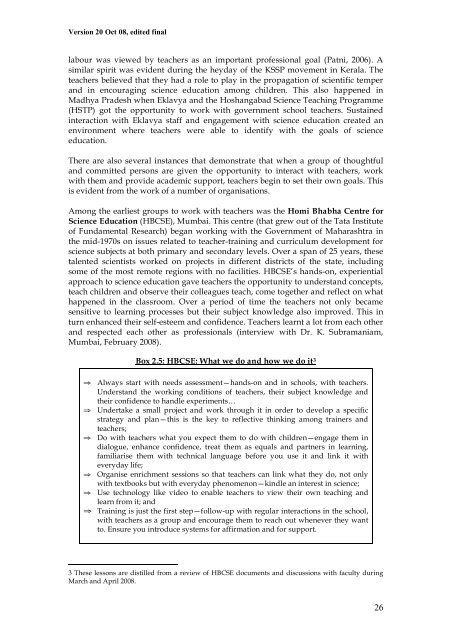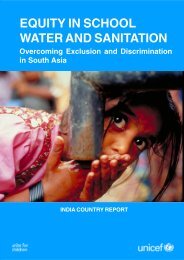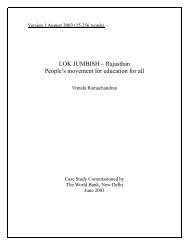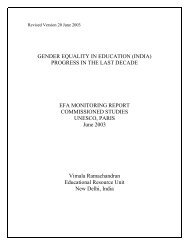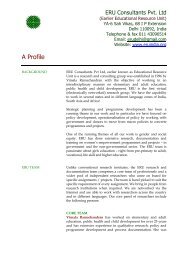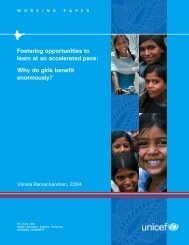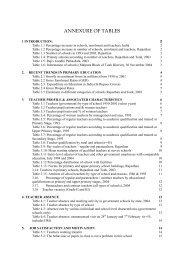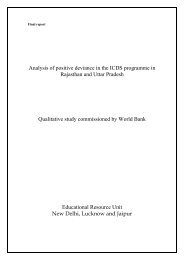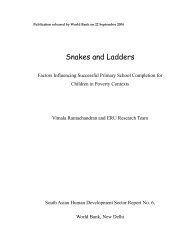primary school teachers the twists and turns of everyday practice
primary school teachers the twists and turns of everyday practice
primary school teachers the twists and turns of everyday practice
You also want an ePaper? Increase the reach of your titles
YUMPU automatically turns print PDFs into web optimized ePapers that Google loves.
Version 20 Oct 08, edited final<br />
labour was viewed by <strong>teachers</strong> as an important pr<strong>of</strong>essional goal (Patni, 2006). A<br />
similar spirit was evident during <strong>the</strong> heyday <strong>of</strong> <strong>the</strong> KSSP movement in Kerala. The<br />
<strong>teachers</strong> believed that <strong>the</strong>y had a role to play in <strong>the</strong> propagation <strong>of</strong> scientific temper<br />
<strong>and</strong> in encouraging science education among children. This also happened in<br />
Madhya Pradesh when Eklavya <strong>and</strong> <strong>the</strong> Hoshangabad Science Teaching Programme<br />
(HSTP) got <strong>the</strong> opportunity to work with government <strong>school</strong> <strong>teachers</strong>. Sustained<br />
interaction with Eklavya staff <strong>and</strong> engagement with science education created an<br />
environment where <strong>teachers</strong> were able to identify with <strong>the</strong> goals <strong>of</strong> science<br />
education.<br />
There are also several instances that demonstrate that when a group <strong>of</strong> thoughtful<br />
<strong>and</strong> committed persons are given <strong>the</strong> opportunity to interact with <strong>teachers</strong>, work<br />
with <strong>the</strong>m <strong>and</strong> provide academic support, <strong>teachers</strong> begin to set <strong>the</strong>ir own goals. This<br />
is evident from <strong>the</strong> work <strong>of</strong> a number <strong>of</strong> organisations.<br />
Among <strong>the</strong> earliest groups to work with <strong>teachers</strong> was <strong>the</strong> Homi Bhabha Centre for<br />
Science Education (HBCSE), Mumbai. This centre (that grew out <strong>of</strong> <strong>the</strong> Tata Institute<br />
<strong>of</strong> Fundamental Research) began working with <strong>the</strong> Government <strong>of</strong> Maharashtra in<br />
<strong>the</strong> mid-1970s on issues related to teacher-training <strong>and</strong> curriculum development for<br />
science subjects at both <strong>primary</strong> <strong>and</strong> secondary levels. Over a span <strong>of</strong> 25 years, <strong>the</strong>se<br />
talented scientists worked on projects in different districts <strong>of</strong> <strong>the</strong> state, including<br />
some <strong>of</strong> <strong>the</strong> most remote regions with no facilities. HBCSE’s h<strong>and</strong>s-on, experiential<br />
approach to science education gave <strong>teachers</strong> <strong>the</strong> opportunity to underst<strong>and</strong> concepts,<br />
teach children <strong>and</strong> observe <strong>the</strong>ir colleagues teach, come toge<strong>the</strong>r <strong>and</strong> reflect on what<br />
happened in <strong>the</strong> classroom. Over a period <strong>of</strong> time <strong>the</strong> <strong>teachers</strong> not only became<br />
sensitive to learning processes but <strong>the</strong>ir subject knowledge also improved. This in<br />
turn enhanced <strong>the</strong>ir self-esteem <strong>and</strong> confidence. Teachers learnt a lot from each o<strong>the</strong>r<br />
<strong>and</strong> respected each o<strong>the</strong>r as pr<strong>of</strong>essionals (interview with Dr. K. Subramaniam,<br />
Mumbai, February 2008).<br />
Box 2.5: HBCSE: What we do <strong>and</strong> how we do it 3<br />
⇒ Always start with needs assessment—h<strong>and</strong>s-on <strong>and</strong> in <strong>school</strong>s, with <strong>teachers</strong>.<br />
Underst<strong>and</strong> <strong>the</strong> working conditions <strong>of</strong> <strong>teachers</strong>, <strong>the</strong>ir subject knowledge <strong>and</strong><br />
<strong>the</strong>ir confidence to h<strong>and</strong>le experiments…<br />
⇒ Undertake a small project <strong>and</strong> work through it in order to develop a specific<br />
strategy <strong>and</strong> plan—this is <strong>the</strong> key to reflective thinking among trainers <strong>and</strong><br />
<strong>teachers</strong>;<br />
⇒ Do with <strong>teachers</strong> what you expect <strong>the</strong>m to do with children—engage <strong>the</strong>m in<br />
dialogue, enhance confidence, treat <strong>the</strong>m as equals <strong>and</strong> partners in learning,<br />
familiarise <strong>the</strong>m with technical language before you use it <strong>and</strong> link it with<br />
<strong>everyday</strong> life;<br />
⇒ Organise enrichment sessions so that <strong>teachers</strong> can link what <strong>the</strong>y do, not only<br />
with textbooks but with <strong>everyday</strong> phenomenon—kindle an interest in science;<br />
⇒ Use technology like video to enable <strong>teachers</strong> to view <strong>the</strong>ir own teaching <strong>and</strong><br />
learn from it; <strong>and</strong><br />
⇒ Training is just <strong>the</strong> first step—follow-up with regular interactions in <strong>the</strong> <strong>school</strong>,<br />
with <strong>teachers</strong> as a group <strong>and</strong> encourage <strong>the</strong>m to reach out whenever <strong>the</strong>y want<br />
to. Ensure you introduce systems for affirmation <strong>and</strong> for support.<br />
3 These lessons are distilled from a review <strong>of</strong> HBCSE documents <strong>and</strong> discussions with faculty during<br />
March <strong>and</strong> April 2008.<br />
26


